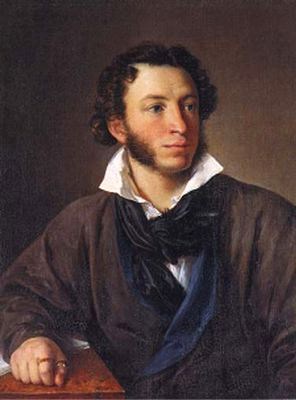
Legacy
Literary legacy
Critics consider many of his works masterpieces, such as the poem The Bronze Horseman and the drama The Stone Guest, a tale of the fall of Don Juan. His poetic short drama “Mozart and Salieri” was the inspiration for Peter Shaffer‘s Amadeus. Pushkin himself preferred his verse novel Eugene Onegin, which he wrote over the course of his life and which, starting a tradition of great Russian novels, follows a few central characters but varies widely in tone and focus.
“Onegin” is a work of such complexity that, while only about a hundred pages long, translator Vladimir Nabokov needed two full volumes of material to fully render its meaning in English. Because of this difficulty in translation, Pushkin’s verse remains largely unknown to English readers. Even so, Pushkin has profoundly influenced western writers like Henry James.[23]
Musical legacy
Pushkin’s works also provided fertile ground for Russian composers. Glinka‘s Ruslan and Lyudmila is the earliest important Pushkin-inspired opera, and a landmark in the tradition of Russian music. Tchaikovsky‘s operas Eugene Onegin (1879) and The Queen of Spades (1890) became perhaps better known outside of Russia than Pushkin’s own works of the same name.
Mussorgsky‘s monumental Boris Godunov (two versions, 1868-9 and 1871-2) ranks as one of the very finest and most original of Russian operas. Other Russian operas based on Pushkin include Dargomyzhsky‘s Rusalka and The Stone Guest; Rimsky-Korsakov‘s Mozart and Salieri, Tale of Tsar Saltan, and The Golden Cockerel; Cui‘s Prisoner of the Caucasus, Feast in Time of Plague, and The Captain’s Daughter; Tchaikovsky‘s Mazeppa; Rachmaninov‘s one-act operas Aleko (based on The Gypsies) and The Miserly Knight; Stravinsky‘s Mavra, and Nápravník‘s Dubrovsky.
Additionally, ballets and cantatas, as well as innumerable songs have been set to Pushkin’s verse (including even his French-language poems, in Isabelle Aboulker’s song cycle “Caprice étrange”). Suppé, Leoncavallo and Malipiero,have also based operas on his works.[24]
The Desire of Glory, which has been dedicated to Elizaveta Vorontsova, was set to music by David Tukhmanov (Vitold Petrovsky — The Desire of Glory on YouTube), as well as Keep Me, Mine Talisman, — by Alexander Barykin (Alexander Barykin — Keep Me, Mine Talisman on YouTube) and later by Tukhmanov.
Romanticism
Pushkin is considered by many to be the central representative of Romanticism in Russian literature, however, he can’t be labelled unequivocally as a Romantic. Russian critics have traditionally argued that his works represent a path from neo-Classicism through Romanticism to Realism. An alternative assessment suggests that “he had an ability to entertain contrarities [sic] which may seem Romantic in origin, but are ultimately subversive of all fixed points of view, all single outlooks, including the Romantic” and that “he is simultaneously Romantic and not Romantic”.[1]
Influence on the Russian language
According to Vladimir Nabokov,
Pushkin’s idiom combined all the contemporaneous elements of Russian with all he had learned from Derzhavin, Zhukovsky, Batyushkov, Karamzin and Krylov; these elements are:
1. The poetical and metaphysical strain that still lived in Church Slavonic forms and locutions;
2. Abundant and natural gallicisms;
3. The everyday colloquialisms of his set; and
4. Stylized popular speech. He made a salad of the famous three styles (low, medium elevation, high) dear to the pseudoclassical archaists, and added to it the ingredients of Russian romanticists with a pinch of parody.[25]
Pushkin is usually credited with developing Russian literature. Not only is he seen as having originated the highly nuanced level of language which characterizes Russian literature after him, but he is also credited with substantially augmenting the Russian lexicon. Where he found gaps in the Russian vocabulary, he devised calques. His rich vocabulary and highly sensitive style are the foundation for modern Russian literature. His talent set up new records for development of the Russian language and culture. He became the father of Russian literature in the 19th century, marking the highest achievements of 18th century and the beginning of literary process of the 19th century. Alexander Pushkin introduced Russia to all the European literary genres as well as a great number of West European writers. He brought natural speech and foreign influences to create modern poetic Russian. Though his life was brief, he left examples of nearly every literary genre of his day: lyric poetry, narrative poetry, the novel, the short story, the drama, the critical essay, and even the personal letter.
Pushkin’s work as a journalist marked the birth of Russian magazine culture which included him devising and contributing heavily to one of the most influential literary magazines of the 19th century, the Sovremennik (The Contemporary, or Современник). Pushkin inspired the folk tales and genre pieces of other authors: Leskov, Esenin, and Gorky. His use of Russian language formed the basis of the style of novelists Ivan Turgenev, Ivan Goncharov, and Leo Tolstoy, as well as that of subsequent lyric poets such as Mikhail Lermontov. Pushkin was analyzed by Nikolai Vasilyevich Gogol, his successor and pupil, and the great Russian critic Vissarion Grigoryevich Belinsky who has also produced the fullest and deepest critical study of Pushkin’s work, which still retains much of its relevance.
(SOURCE: Wikipedia)
